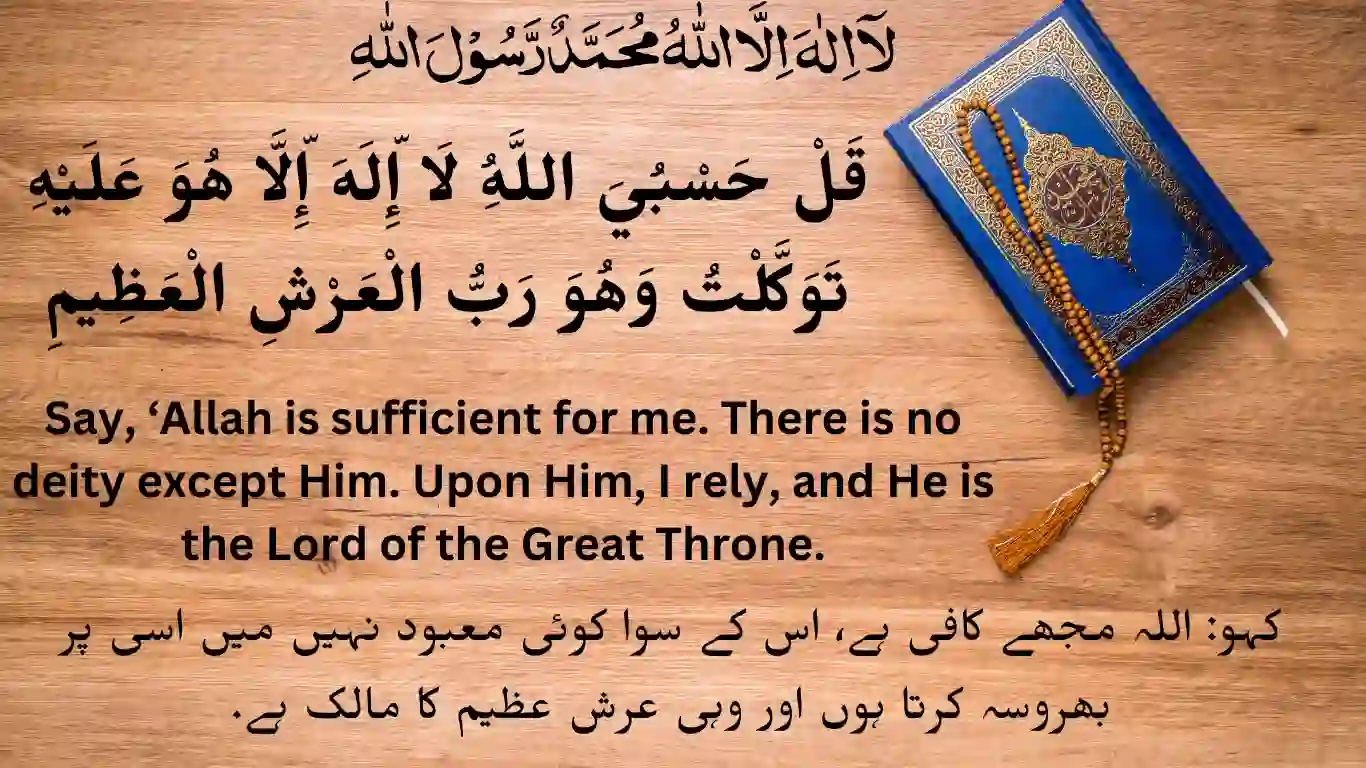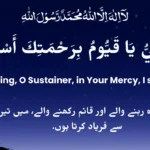The phrase hasbi allahu la ilaha illallah carries immense spiritual depth and significance. It is a powerful declaration of faith, trust, and reliance upon Allah. In this article, we will delve into each part of this phrase with relevant Arabic verses, their Urdu translations, and English interpretations, ensuring an enriching and informative experience for readers seeking to deepen their understanding.
| What is Rabbana Hablana Dua? |
| What is Rabbi Inni Maghloobun Fantasir Dua? |
| Rabbana Lakal Hamd – All Praise is Due to Allah |
| Subhana Rabbika Rabbil izzati Amma Yasifun |
Hasbi allahu la ilaha illallah verses
1. Hasbi Allahu (حسبي الله)
The phrase begins with Hasbi Allahu, meaning “Allah is sufficient for me.” This conveys a believer’s complete reliance on Allah for all matters in life.
Quranic Reference:
قَلْ حَسْبُيَ اللَّهُِ لَا ّإِلَهَ ّإِلَّا هُوَ عَلَيْهِ تَوَكَّلْتُ وَهُوَ رَبُّ الْعَرْشِ الْعَظِيمِ
Transliteration: Qul Hasbiyallahu la ilaha illa Huwa, ‘alayhi tawakkaltu wa Huwa Rabbul-‘arshil-‘azim.
English Translation: “Say, ‘Allah is sufficient for me. There is no deity except Him. Upon Him, I rely, and He is the Lord of the Great Throne.’” (Surah At-Tawbah 9:129)
Urdu Translation: “
کہو: اللہ مجھے کافی ہے، اس کے سوا کوئی معبود نہیں۔ میں اسی پر بھروسہ کرتا ہوں اور وہی عرش عظیم کا مالک ہے۔”
This verse encapsulates the essence of trust and reliance upon Allah, illustrating that He alone suffices in every situation.
2. La Ilaha Illallah (لا إِلَهَ إِلَّا اللَّهُ)
This declaration, meaning “There is no god but Allah,” emphasizes the oneness of Allah and serves as the cornerstone of Islamic faith.
Quranic Reference:
لَا إِلَهَ إِلَّا اللَّهُ وَحْدَهُ لَا شَرِيْكَ لَهُ
Transliteration: La ilaha illa Allahu wahdahu la sharika lahu.
English Translation: “There is no god but Allah alone, without any partners.” (Surah Al-Ikhlas 112:1-4)
Urdu Translation: “
اللہ کے سوا کوئی معبود نہیں، وہ واحد ہے اور اس کا کوئی شریک نہیں۔”
This phrase underpins the belief in Tawheed (monotheism), a fundamental aspect of Islam.
3. Alayhi Tawakkaltu (عَلَيْهِ تَوَكَّلْتُ)
The final part of the phrase, Alayhi Tawakkaltu, translates to “Upon Him, I rely.” This reflects absolute trust and reliance on Allah for guidance and support.
Quranic Reference:
وَمَنْ يَتَوَكَّلْ عَلَى اللَّهِ فَهُوَ حَسْبُهُ
Transliteration: Wa man yatawakkal ‘ala Allahi fahuwa hasbuhu.
English Translation: “And whoever relies upon Allah – then He is sufficient for him.” (Surah At-Talaq 65:3)
Urdu Translation: “
جو اللہ پر بھروسہ کرے گا، وہ اسے کافی ہوگا۔”
This verse reassures believers of Allah’s support and sufficiency for those who place their trust in Him.
Spiritual Impact of the Phrase
Reciting “Hasbi Allahu la ilaha illallah alayhi tawakkaltu” strengthens a believer’s connection with Allah. It reminds us to seek help and solace in Him during trials and to affirm our faith in His oneness and sufficiency.
- Emotional Peace: Trusting in Allah alleviates stress and anxiety.
- Spiritual Growth: Repeating this phrase fosters a deeper sense of reliance and gratitude.
- Daily Affirmation: Incorporating this in daily life serves as a spiritual anchor.
FAQs
It means “Allah is sufficient for me. There is no deity except Him. Upon Him, I rely.” This phrase reflects unwavering faith and trust in Allah.
It can be recited at any time, especially during moments of hardship or when seeking Allah’s guidance and support.
Reciting this phrase brings peace, reinforces faith in Allah’s oneness, and reminds us of His sufficiency in every matter.
By understanding and practicing the essence of “hasbi allahu la ilaha illallah,” we can strengthen our faith and find solace in the ever-present mercy and support of Allah. Incorporate this beautiful phrase into your daily life to experience its profound spiritual benefits.




